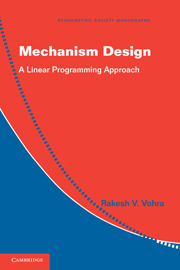1 - Introduction
Published online by Cambridge University Press: 05 January 2013
Summary
The 2007 Nobel Prize in economics honored a subject, mechanism design, fundamental to the study of incentives and information. Its importance is difficult to convey in a sound bite because it does not arise from a to-do list or a ten-point plan. Rather, it is an analytical framework for thinking clearly and carefully about the most fundamental of social problems: What exactly can a given institution achieve when the information necessary to make decisions is dispersed and privately held? The range of questions to which the approach can be applied is striking. To achieve a given reduction in carbon emissions, should one rely on taxes or a cap-and-trade system? Is it better to sell an Initial Public Offering (IPO) via auction or the traditional book-building approach? Would juries produce more informed decisions under a unanimity rule or that of simple majority? Mechanism design helps us understand how the answers to these questions depend on the details of the underlying environment. In turn, this helps us understand which details matter and which do not.
To get a sense of what mechanism design is, we begin with a fable, first told by the Nobelist, Ronald Coase. It involves, as all good fables do, a coalburning locomotive and a farmer. The locomotive emits sparks that set fire to the farmer's crops. Suppose that running the locomotive yields $1,000 worth of profit for the railroad but causes $2,000 worth of crop damage.
Information
- Type
- Chapter
- Information
- Mechanism DesignA Linear Programming Approach, pp. 1 - 6Publisher: Cambridge University PressPrint publication year: 2011
